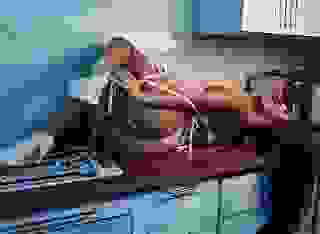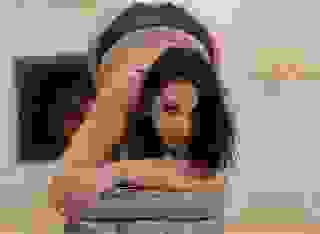- Erotic Couplings
- Gerry's Gift
Note: You can change font size, font face, and turn on dark mode by clicking the "A" icon tab in the Story Info Box.
You can temporarily switch back to a Classic Literotica® experience during our ongoing public Beta testing. Please consider leaving feedback on issues you experience or suggest improvements.
Click hereThis is a story, with some sex. If you are looking for stroke, this will only waste your time. Reading her mother's journal, Gerry decides that mother really did know best.
*
My father's funeral was short and to the point, just as he wanted. Captain Jean Pierre Devereux, U.S.N. (Ret.), may have flown helicopters, but he was a sailor in his soul.
We sang "Eternal Father, strong to save" and the Navy service for burial at sea was said, despite his interment in the solid earth of the little Episcopal Church in St. Mary's City, next to my mother's grave. And then, clad in my regulation black dress and poker face, I accepted the sympathy of the assembled, taking what comfort I could from the obvious respect shown for my father by men in the uniforms of many services.
Among them, Dondi stood out, wearing a prayer shawl, sidelocks, and black hat. He knew Dad in Viet Nam and Desert Storm, and they were hunting buddies afterward. Dondi got his callsign from a round, guileless face said to resemble some cartoon strip character from before my time. He still looked that way when he took me aside afterwards and we sat in the Rector's office to talk.
"Quite a disguise," I said. "Covert ops? I'd have thought you would have worn your uniform."
"I haven't put on my uniform in several years. Besides, my haircut is no longer regulation. Just going back to my roots," smiled Dondi. "In fact, speaking of going, I have to leave soon. But I wanted you to know what your father really did in the service. I'm sure he never told you, and I can't tell you all of it, but I'll tell you about the last time he saved my life..."
*****
The expressionless CPO sat stiffly in the metal chair. He faced a lieutenant who, like the chief, showed his rank with flat black insignia sewn onto his desert BDUs. The drab plainness made the gold breast device-anchor, eagle, trident and pistol-even more prominent than it normally was, representing what it did. Even among professional military warriors, SEAL team members command respect.
But not good staterooms. Conversation was periodically interrupted by the massive whang of the steam catapult almost directly above. The carrier was launching aircraft. On January 14, 1991, flight ops were necessary around the clock in the Persian Gulf. In the early hours of the 16th, Desert Storm would begin.
The lieutenant spoke, "Solomon, you heard the briefing. We have to try to get that staff puke into that command trailer and keep him secure inside for two hours. I don't know what lard-assed Pentagon genius decided that a SEAL platoon was the right unit to hold a static position inside an Iraqi missile site, but we're stuck with it. With inadequate time to rehearse at that. We're going to be hurt on this one, Sollie, and ordinarily I'd be counting on you to hold things together if I buy it - but not this time."
Solomon automatically reached for the envelope with the broken "eyes only" seal in the lieutenant's outstretched hand before those last words registered.
"I'm still going?"
"Yeah, but read those orders. Helluva note."
Solomon's eyes opened marginally wider as he scanned the page. "They're going to disavow this if it comes out, aren't they? It'll be my ass while the desk pilots cover theirs, won't it, Sir?"
The lieutenant took the orders back and locked them in his safe. "'Fraid so, Sollie. Will you do it?"
"Why me, Lieutenant."
"You're a sniper. I guess they figure you've done it before. At least that's the way the bastards think. Vital to national security, though, so sayeth the man who signed those orders himself. Will you do it? I won't order you to."
"Yessir. Don't much like it though. Fuckin' A."
"Carry the M-14 instead of the McMillan 88. We may need the higher rate of fire, and your main job won't be sniping this time."
Solomon grinned, "'One shot, one kill,' don't need no high rate of fire, Lieutenant."
"Sure Sollie. Just carry the fucking M-14. And these three rounds go in the top of the magazine for your sidearm. Use them if you must carry out those orders. Be careful with them, though, they carry some ricin derivative in that capsule in the hollow point. Hit your target anywhere and he's dead. Sign here. They came from the Company and the Company wants them back if not expended. And accounted for if you use them."
Solomon signed the receipt, repressing his feelings about the CIA's obsession with unnecessary paraphernalia like poison bullets. God knows I don't need these to kill what I aim at, he thought.
Solomon spoke, "We gonna outfit the staff puke? And the civilian?"
The lieutenant answered, "Weapons only. And a personal communicator for each. For the rest, they brought their own gear. Have 'Cuda get on it."
"Aye, aye, Sir."
The lieutenant turned to put the envelope and the receipt in his safe as the door closed. His "Helluva note" was drowned out by the catapult's whang.
The staff puke was bulky next to the lean efficiency of the SEAL Team members on the carrier's fantail. Like a St. Bernard among greyhounds. But he had chosen the silenced H&K MP-5 with confidence from among the weapons offered by McDonald, or 'Cuda, as he was known in the Teams. The staff puke was calmly firing three round bursts into floating trash bags in the wake with a familiarity unlikely in a SWO.
Maybe this guy won't get us all killed right away, mused McDonald. I guess I'll carry the Remington myself, since he doesn't seem to need a shotgun to hit his targets. "Got a name, Commander?" asked McDonald. He obviously didn't buy the appellation "Smith" on the Commander's name tag. "What are we going to call you on this op, sir?"
"My callsign is 'Smitty,' 'Cuda. Cut the commander-sir crap until we get back, please. Just Smitty." With that he secured the H&K and began slow fire with a personal weapon that looked like a match grade.45.
"How are your legs, Smitty? We'll have close on to thirteen clicks from the LZ to the objective, and less than four hours to do it in." This was no idle question. The team members had all seen the "water wings" breast device of a Surface Warfare Officer on Smitty's uniform. And he looked at least forty, overage for a lieutenant commander, unless he was, God forbid, a Reserve. Blackshoe sailors, especially old ship drivers were not noted for physical endurance, and Reserves were essentially civilians as far as conditioning went.
"I'll get there." The commander secured his weapons and started forward.
Solomon came out of the shadows from which he had watched the weapons test. MacDonald turned to him and said, "I saw a Pave Low arrive with a couple of Snakes a few minutes ago. Our ride, I presume. Who's driving this trip?"
"We got lucky this time," said Solomon, "we've got Devereux in the right seat of the H-53, and Evans in the left. I don't know who's in the Cobra's. Couple of Marines, though, so we can count on close support if we need it."
"I know Evans," said Jones from the side. "He's good. He got most of us out of the water before we drowned at Grenada. God, what a fuck up. But who's Devereux?"
"That's Captain Devereux to you, Jonesie, and he's the guy we always requested in Nam. Best damn spec ops pilot I've ever seen. I doubt I'd be here now but for him."
"Shit, just what we need: another geezer. No offense, Sollie..."
"Let me know any time you think you can take me, Jonesie," said Solomon through a grin that didn't reach his eyes. "Meanwhile, let's hit the rack. Final brief at 1330 tomorrow, lift off at 1630." He turned and disappeared through the hatch toward the platoon's berthing compartment.
Hours later, the SEAL Platoon moved cautiously through the desert toward its objective. The MH-53J helicopter had gone feet dry just as the sun dipped below the horizon, and had deposited them in a box canyon about thirteen kilometers from the objective.
The platoon flowed over the terrain in a rough box around the two men in Bedouin robes who walked openly on the dry creek bed below. Solomon looked down and conceded that the staff puke and the elderly civilian they had been saddled with were covering the distance at a steady pace, with no signs of tiring. The staff puke had no training in the irregular, hyper-attentive patterns of movement and stillness that had let the rest of the platoon move undetected among the enemy so many times in the past, so it had been decided to let him move openly. Fortunately, they had met no one that the pair below would have to bluff.
He was less concerned about the civilian. He wore his attire with obvious familiarity and looked like a raghead, but the signs of Ranger training and of Camp Peary had been unmistakable here in the field. Clearly a Company man who had been here before.
Light flared in his night vision equipment as Jonesie, the point man, exposed a small penlight to the pair to mark the next turn. It was the last turn before the objective. Just 1.3 clicks and 27 minutes left to do it in. Looks like we'll make it with time to spare, thought Solomon.
Twelve minutes ahead of schedule, the Platoon rendezvoused outside the Iraqi missile site. The staff puke and the civilian shed their robes to reveal BDUs underneath, the staff puke matched the SEALs' mottled desert tan, while the civilian wore the green of the Iraqi army. The staff puke donned night vision gear and a personal communicator like the SEALs.
In silence each checked his weapons, making sure there was a round in the chamber and that the magazine was properly seated. After a last pull at their camelbacks, the lieutenant gestured and the Platoon members moved out on their assigned tasks, communicating by hand signal only.
Precisely on time, the voice of the civilian called out quietly to the nearest sentry in Arabic. This was the most uncertain part of the plan. Reconnaissance had shown that there was a sergeant of the guard in the barracks. To avoid a fight, they needed to get him out of the barracks without causing a commotion. Solomon knew the sentries would believe the civilian to be a deserter.
They all knew it was an open question whether this would result in sympathy or an arrest that might awaken the camp. This time they were lucky. These were no Republican Guards, and a hushed conversation ensued.
The sergeant of the guard was quietly summoned and the other two sentries came over to see what was going on. With all three sentries and the sergeant distracted by the civilian's performance, it was routine for the Platoon to take them out silently. The civilian would stand by to answer any inquiries if anyone came to check on the sentries.
With the area secured, Solomon tapped Smitty and motioned for him to follow. They moved toward the door of what appeared to be a trailer mostly buried in the sand. As they moved, three members of the Platoon materialized in front of them and entered the trailer. Two silenced double taps, and then another, single, report indicated the end of the two operators inside.
Their bodies had already been dragged against the wall when Solomon and Smitty entered. Two of the SEALs exited, leaving MacDonald at the doorway. Outside, Solomon knew the Platoon was setting up a perimeter to give the staff puke the time to do whatever it was they had brought him here to do.
"The box, please."
Solomon pulled from its case a small aluminum box he had been carrying. The lieutenant carried its twin. Carefully disarming the self-destruct thermite charge, he opened it and handed it to the staff puke. It was filled with computer disks of various sizes.
The staff puke sat down before a boxy keyboard and examined the racked equipment before him. After several minutes, he reached into the box and pulled out a computer disk like none that Solomon had ever seen. The thing was huge - eight inches or more on a side. Smitty put the disk into a drive and began to type. The drive startled Solomon when it revved up. It was loud. Lines of letters and numbers appeared on the display in front of the staff puke.
For over an hour, Smitty sat in front of the display, typing and inserting disk after disk. It seemed like an eternity to Solomon, who could do nothing except watch and worry about discovery.
Finally, the staff puke stood up, pushed a key, and retrieved the last disk he had put in the drive. It was 0147. Thirteen minutes ahead of schedule. He turned to Solomon and said, "Let's go." Behind him, the display was going crazy.
Simultaneously the door on the opposite side of the trailer, one the Platoon had believed buried in the sand, opened. Two Iraqi soldiers looked blankly at their fallen comrades and then fumbled to pull sidearms from holsters.
Two blasts from MacDonald's shot gun took them out, but the noise was horribly loud in Solomon's ears as he dove toward the door frame. For the first time he spoke into the tiny boom mike by his cheek.
"Six, this is Dondi. X-ray Foxtrot." The code for the completion of Smitty's task. "There was a buried passage to another bunker on the east side. They know we're here. Fade, out."
"Roger, Dondi. Platoon, Six, fade, out."
By the time the trio was out the door, it was clear the alarm had sounded. Shouts and noise surrounded Solomon as he pushed Smitty toward the trail that led to the retrieval LZ, a kilometer to the south.
Then all hell broke loose. Two SEALs and Smitty went down in the initial volley from the squad of Iraqi's running around a derelict truck. The coordinated fire power of the Platoon took them down, but now the Iraqis knew where to look.
The Lieutenant moved the team into an empty, roofed revetment, open at both ends and big enough to conceal two or three mobile Scud launchers. It was a tenuous position, but the closed side was toward the enemy and it gave them a chance to regroup.
It looked bad to Solomon. SEALs never leave their wounded or dead behind by choice, but the only way out of here looked like a scatter followed by a sneak to the alternate LZ, some seventeen clicks away. No way they could take out the wounded teammates that way.
The lieutenant caught Solomon's eye, then looked at the staff puke. Solomon followed the gaze then nodded. Jonesie was pressing a bloody sterile pad against Smitty's right hip. He wasn't going to make it out either.
Then the noise and confusion outside was suddenly overwhelmed by jet engines and rotor wash. Solomon's jaw dropped as the MH-53 came in under the roof beam, right into the revetment. Brakes squealed as it rolled and skidded to a stop.
Instantly hands loaded the wounded aboard. Solomon handed the staff puke aboard and then followed. The lieutenant was up at the cockpit already. He started pulling a bloody body from the left seat, as he called to Solomon to get the staff puke up there.
Solomon helped the staff puke forward, supporting his right side. The staff puke grimaced in pain as they loaded him roughly into the co-pilot's seat. An entry hole cobwebbed the side window beyond. Devereux' helmet was cracked down the side. Must have been a helluva blow to do that, thought Solomon.
The lieutenant spoke, "The Captain tells me he gets vertigo as soon as he open his eyes. He thinks Smitty can fly this bird once it's off the ground, but its risky. Smitty has no solo helicopter time. What do you think?"
"Take the platoon to the alternate LZ, Lieutenant. Let the Captain and Smitty try to get the wounded out. I'll stay with them."
"God speed, Sollie." And the Lieutenant and the Platoon were gone.
"Smitty, set the HSI to track 172 degrees," said Devereux, with eyes clenched shut. As soon as I get us up a few feet, the aircraft will turn on its own to the HSI heading. Then you move us out, just like the lessons I gave you in the Robinson."
As soon as the flight crewmen at the door called clear, Captain Devereux started the big Pave Low forward, gunning the engines and pulling back on the collective as soon as they were clear of the revetment. When the helo was five feet up, he took his hands and feet off the controls and yelled "Your airplane!" His eyes clamped shut again.
As the helicopter turned toward the south, the staff puke put the stick forward and pulled the collective. The helicopter accelerated into a climbing turn. Behind them, two Cobra gunships turned from the revetment area to cover the SEAL Platoon's retreat.
Suddenly the whole base seemed to explode. It was 0200, and the first air strike of the war, targeted against the antiaircraft capabilities of the Iraqis, had arrived. Ground fire ceased as the startled Iraqis took cover.
The staff puke and Capt. Devereux decided to try for the carrier. The flight was surprisingly smooth and uneventful, after the Captain helped the staff puke get the aircraft trimmed out. The real problem was going to be landing.
"John," said the staff puke, "I can't use my right leg. No right pedal. No right brake. Even if I get this thing close to the flight deck, I don't see how we'll get it stopped. And I sure as hell don't want to try to hover."
"Smitty, we'll dial in too much contra-rotation so you will need to hold in left pedal to stay straight. Then you can ease off if you need right pedal. The carrier will be going 30 knots, so your relative speed will only be 20 knots if you make a 50 knot running landing. The cyclic and the pedals will be similar to fixed wing controls at that speed, letting you concentrate more on the collective. Get us down, put the collective full down, stick forward, and I'll take care of the brakes."
"You sure you just don't want to ditch?" asked Smitty.
"What, and lose this valuable government property? Shit no! I signed for this aircraft. And besides, ditching would be even more dangerous for the wounded. Give it a shot, Smitty."
*****
"And he did," said Dondi to me. "We ended up too close to the edge of the flight deck for my taste, but we got down. And our wounded were in the sickbay in time to save them. Thanks to your Dad."
"That's what your Dad really did, Gerry. Coming to get us at all was against normal procedures, and risky as hell. I doubt that anybody but your Dad could have figured out where we were and flown that bird into the revetment like that. And it wasn't the first time. He saved my butt in Nam and Cambodia too. He was a damn fine pilot and one hell of a brave man. The best. You should be proud of him."
"Oh I am, Dondi," I said, "I always have been. But thank you for staying with him to help. I'm sure he appreciated it."
"Much as I'd like to take credit, Gerry, I didn't stay with your Dad to help. I'd have gone with the platoon if I could've. But I had to stay. For a different reason."
"What was that," I asked.
Dondi turned and pointed out the window. "My orders were to kill that staff puke if it looked like the ragheads would get him alive. And I think you owe him some of the thanks for getting your father back." He was pointing at Buddy.
*****
Buddy was a legacy from my mother. When I was nine, my mother was diagnosed with breast cancer. Treatment options were more limited then, and the radical mastectomies and chemotherapy produced only a short period of remission.
She seized that short reprieve with a passion. She enveloped me with her love as she prepared me for her death. She drew on an inner strength that I now realize was extraordinary, and shared that strength with my father. He needed it. He was a Navy pilot, with combat tours in Viet Nam, but he didn't know how to deal with Mom's illness. It was something he could do absolutely nothing about. He looked and acted helpless most of the time, and that made it harder on all of us. But Mom bucked him up, and eventually he became a rock to which I could cling after Mom was gone.
After she died, I found that the thing that had consumed most of her attention when I was at school or asleep was her journal. It was more than a collection of pages; it was a time capsule. There was a traditional bound book in which she had written messages to me, family histories and anecdotes, and musings on many subjects, but the book rested in a large jewelry case with many drawers. Each of those drawers was labeled with a date or event, and each contained a special communication from my Mom. One drawer contained envelopes, one for each of my birthdays except my sixteenth and my twenty-first. Those two rated separate drawers. And there were drawers or envelopes for special events, like my first date. One was labeled "The bases." I finally figured that one out after second base.








